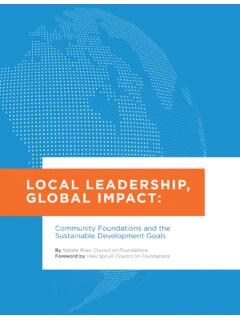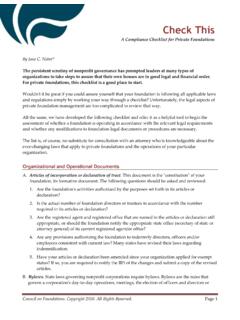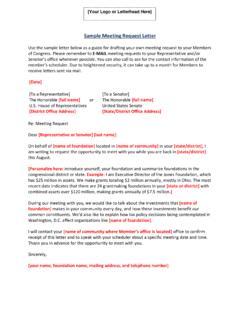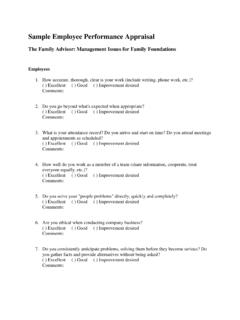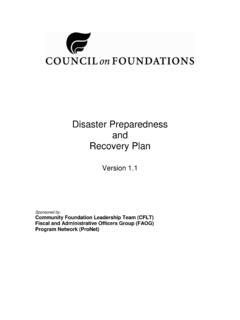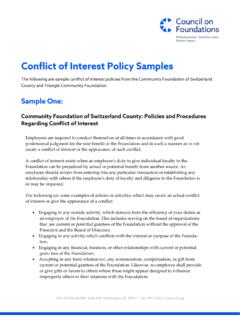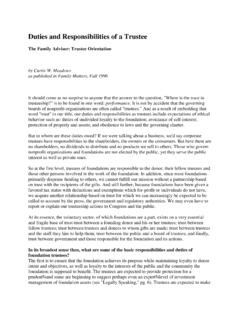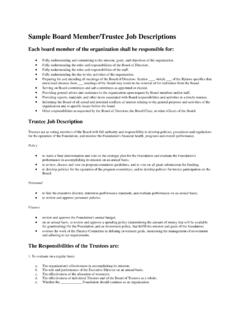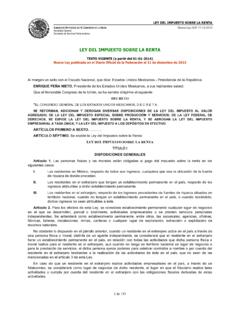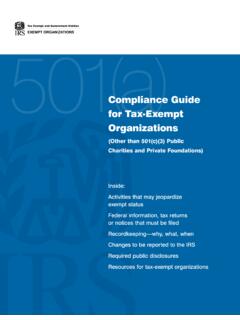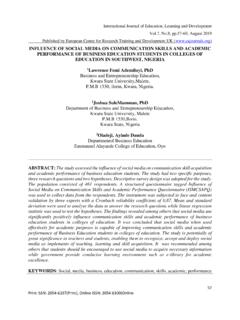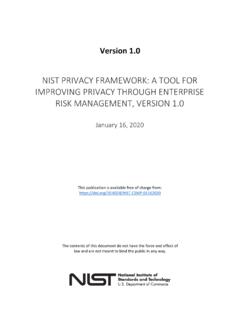Transcription of Competencies for CEOs of PFS - Council on Foundations
1 Competencies FORC hief Executive Officers Private FoundationsofVISIONThe Council s vision for the field is ofA vibrant, growing and responsible philanthropic sector that advances the common see ourselves as part of a broad philanthropic community that will contribute to this vision. Weaim to be an important leader in reaching the Council on Foundations provides the opportunity, leadership and tools needed by philanthropicorganizations to expand, enhance and sustain their ability to advance the common carry out this mission, we will be a membership organization with effective and diverse leadershipthat helps the field be larger, more effective, more responsible and more common good we mean the sum total of conditions that enable community members to achievements have a shared nature that goes beyond individual philanthropic organizations we mean any vehicle that brings people together to enhance the effectiveness, impact and leverage of their philanthropy.
2 This includes private and community Foundations , corporate Foundations and giving programs, operating Foundations , and public Foundations ,as well as emerging giving and grantmaking mechanisms involving collective OF INCLUSIVENESSThe Council on Foundations was formed to promote responsible and effective philanthropy. The mission requires a commitment to inclusiveness as a fundamental operating principle and calls for anactive and ongoing process that affirms human diversity in its many forms, encompassing but not limited to ethnicity, race, gender, sexual orientation, economic circumstance, disability and seek inclusiveness in order to ensure that a range of perspectives, opinions and experiences arerecognized and acted upon in achieving the Council s mission. The Council also asks members tomake a similar commitment to inclusiveness in order to better enhance their abilities to contribute tothe common good of our changing society.
3 2006 Council on Foundations rights reserved. Data from this report may not be cited or reproduced without attribution to Competencies for Chief Executive Officers of Private Foundationsand the Council on L Street, NW, Suite 300 Washington, DC 20036-5168202/466-6512 , more than 64,000 private philanthropicfoundations play a constructive role in promotingsocial, cultural, economic and environmental innovation and in building and sustaining valuableinstitutions and organizations that benefit society athome and abroad. PRIVATE FOUNDATION CHIEF EXECUTIVE OFFICERS (CEOs), in partnership with their boards, have a pivotal role in the fiscal and program success of their foundation s goals. At the same time, they help to shapepublic issues, enliven and inform public debate, and convene community leaders on matters of public concern. THESE LOFTY CEO RESPONSIBILITIES,however, have only been loosely defined.
4 For example, CEOs areoften expected to creatively expand ways to leverage their foundation s resources with nonprofit sector know-how, bestrategic in their funding choices, demonstrate deep understanding of the foundation s programmatic areas, evaluatethe impact of their funding and make very difficult decisions about priorities, investment strategies, program architecture and sector alignment. Yet these expectations, with all their contradictions and high aims, are more akinto an anthology of hope than to a definition of role. They do not make up a coherent and realistic position profile. RECOGNIZING THIS NEED TO BETTER DEFINE THE CEO s ROLEand other needs related to CEOleadership development, the board of directors of the Council on Foundations charged the Advisory Committee forExecutive Programs (ACEP), made up of current and former foundation senior executives, to help support PrivateFoundation CEO leadership development.
5 Research by ACEP in 2003 and 2004 confirmed that there is a lack ofclarity regarding the role of the foundation CEO that creates a structural impediment to effective leadership. THIS PILOT DOCUMENT ATTEMPTS TO CODIFY THE JOB FUNCTIONS OF THE PRIVATEFOUNDATION CEO(functions) and the skills and knowledge needed to perform these functions, referred to as Competencies . ACEP developed this document with input from foundation staff, board members, academics and others. Council on Foundations PRIVATE FOUNDATION CEOjob functionsin this document are meant to describe the customarycharges of private foundation CEOs. ACEP recognizesthat every foundation is unique and that any standardlisting of functions, including the functions containedin this document, will not fully describe the job ofevery private foundation CEO. Instead, it is hoped thatthese functions describe the preponderance of jobresponsibilities for most private foundation CEOs.
6 Tofully and accurately describe a particular private foun-dation CEO job, the functions may need to be adjustedto fit that foundation s particular context, including thefoundation s size, style, culture and stage in its organiza-tional life cycle. For example, some functions may not apply to certainfoundations. Small or highly specialized foundationsmay choose not to have their CEOs perform certainexternal leadership functions. CEOs of larger founda-tions may delegate the bulk of the staff managementfunctions to another executive. Still, the functions (in figure 2) represent the key leadership-level responsi-bilities that help ensure foundation effectiveness. If afoundation chooses not to include certain functions inthe CEO s job description, it should base this choice onsolid reasoning and ensure that this omission does notundermine the foundation s effectiveness. Even if afoundation decides to delegate one of the CEO s func-tions to another staff member, it is still the CEO sresponsibility to ensure that that function is performedwell.
7 Thus, the CEO must at least perform meaningfuloversight relative to that , some Foundations may find that this list offunctions does not represent everything that is expectedof their CEO. For example, the founders may havecharged the foundation with specific expectations thatimply additional CEO functions. Furthermore, many CEOs have operational as well asexecutive responsibilities. For example, some CEOs mayalso be program officers or chief financial officers. Bydefinition, however, these functions relate only to theexecutive responsibilities of the CEO. CEOs who haveoperational responsibilities will need to add these to thepertinent CEO functions to complete their particularjob make the Private Foundation CEO Functions a moreuseful executive development tool, ACEP decided toidentify the skills and knowledge, or Competencies ,needed to perform each function. These are presentedlater in this document.
8 As with the functions, the unique mission of each foun-dation will influence the ways the Competencies areapplied. For example, it might be appropriate for CEOsof large Foundations to expect other executive staff topossess the necessary Competencies . Similarly, smallerfoundations may use external consultants to ensure thatkey skills and knowledge are reflected at the executivelevel. Furthermore, some CEOs may need to performoperational functions in addition to their executivefunctions. Thus, they need to have operational compe-tencies in addition to these CEO-level Competencies . Insum, adjust the Competencies to the context of yourfoundation. At this time, the private foundation job functions donot address additional family-related demands of CEOs of family Foundations . ACEP plans to modify thefunctions and Competencies to better include theseadditional demands in the future. Explanation of the FunctionsFunctionalCompetenciesSkills and knowledge a foundation CEO needs in order to specifically perform the Private Foundation CEO to each of the 13 CompetenciesEssential skills and knowledge a CEO from any field needs.
9 Critical building blocks for the development of Functional : collaboration/partnership, communication, decisionmaking, governance, management, organizational development, personal and professional development, planning and vision setting. THE Competencies CONSIST OF the keyskills and knowledge that private foundation CEOsneed to perform their job functions well. A skill is thepersonal capacity or capability to do something, such asspeak in public or think strategically. Skills can beobserved. Knowledge is defined as the information andunderstanding one needs to be effective, such as theprincipal laws governing Foundations or the principlesbehind adult learning. There are two types of Competencies . CoreCompetencies cover the essential professional skills andknowledge that any CEO, regardless of field, needs tomaster. Each is essential to the performance of manyPrivate Foundation CEO Functions.
10 FunctionalCompetencies are the skills and knowledge neededeither to perform specific Private Foundation CEOF unctions or to perform functions other sectors havebut are substantively different in the philanthropic sector. Functional Competencies build on the CoreCompetencies. As the name implies, FunctionalCompetencies are grouped by definition, the Functional Competencies represent the level of personal and professional development necessary for individuals to perform the functions this level does not, however, guarantee actual performance of the functions. An individual maypossess all of the necessary Competencies to perform afunction and still lack the time, resources or interest todo so. It is perhaps impossible for any single individual tomaster every one of these skills. Thus, readers shouldinterpret the Competencies as an ideal, and not as minimum job requirements. Explanation of the CompetenciesFigure 1.
